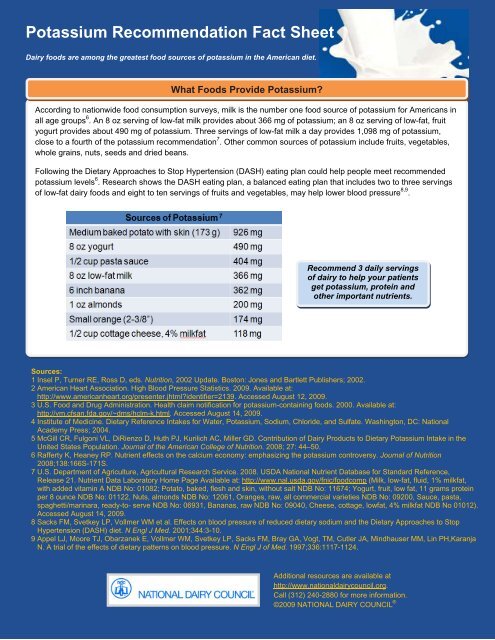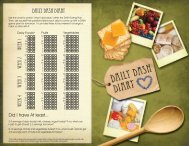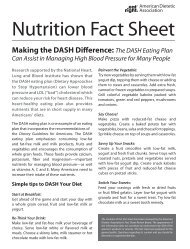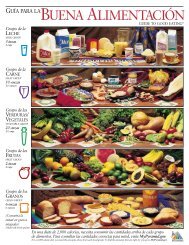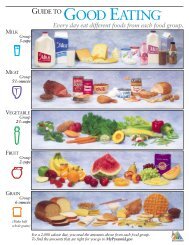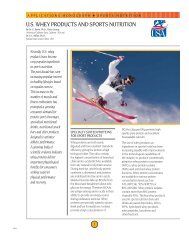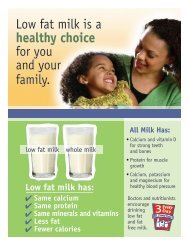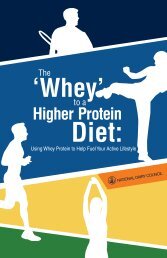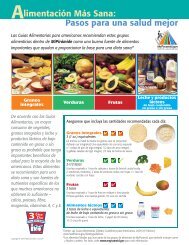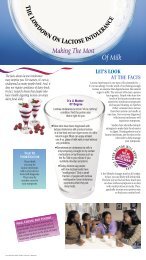Potassium Recommendation Fact Sheet - National Dairy Council
Potassium Recommendation Fact Sheet - National Dairy Council
Potassium Recommendation Fact Sheet - National Dairy Council
You also want an ePaper? Increase the reach of your titles
YUMPU automatically turns print PDFs into web optimized ePapers that Google loves.
<strong>Potassium</strong> <strong>Recommendation</strong> <strong>Fact</strong> <strong>Sheet</strong><br />
<strong>Dairy</strong> foods are among the greatest food sources of potassium in the American diet.<br />
_<br />
What Foods Provide <strong>Potassium</strong>?<br />
According to nationwide food consumption surveys, milk is the number one food source of potassium for Americans in<br />
all age groups 6 . An 8 oz serving of low-fat milk provides about 366 mg of potassium; an 8 oz serving of low-fat, fruit<br />
yogurt provides about 490 mg of potassium. Three servings of low-fat milk a day provides 1,098 mg of potassium,<br />
close to a fourth of the potassium recommendation 7 . Other common sources of potassium include fruits, vegetables,<br />
whole grains, nuts, seeds and dried beans.<br />
Following the Dietary Approaches to Stop Hypertension (DASH) eating plan could help people meet recommended<br />
potassium levels 6 . Research shows the DASH eating plan, a balanced eating plan that includes two to three servings<br />
of low-fat dairy foods and eight to ten servings of fruits and vegetables, may help lower blood pressure 8,9 .<br />
Recommend 3 daily servings<br />
of dairy to help your patients<br />
get potassium, protein and<br />
other important nutrients.<br />
Sources:<br />
1 Insel P, Turner RE, Ross D, eds. Nutrition, 2002 Update. Boston: Jones and Bartlett Publishers; 2002.<br />
2 American Heart Association. High Blood Pressure Statistics. 2009. Available at:<br />
http://www.americanheart.org/presenter.jhtml?identifier=2139. Accessed August 12, 2009.<br />
3 U.S. Food and Drug Administration. Health claim notification for potassium-containing foods. 2000. Available at:<br />
http://vm.cfsan.fda.gov/~dms/hclm-k.html. Accessed August 14, 2009.<br />
4 Institute of Medicine. Dietary Reference Intakes for Water, <strong>Potassium</strong>, Sodium, Chloride, and Sulfate. Washington, DC: <strong>National</strong><br />
Academy Press; 2004.<br />
5 McGill CR, Fulgoni VL, DiRienzo D, Huth PJ, Kurilich AC, Miller GD. Contribution of <strong>Dairy</strong> Products to Dietary <strong>Potassium</strong> Intake in the<br />
United States Population. Journal of the American College of Nutrition. 2008; 27: 44–50.<br />
6 Rafferty K, Heaney RP. Nutrient effects on the calcium economy: emphasizing the potassium controversy. Journal of Nutrition<br />
2008;138:166S-171S.<br />
7 U.S. Department of Agriculture, Agricultural Research Service. 2008. USDA <strong>National</strong> Nutrient Database for Standard Reference,<br />
Release 21. Nutrient Data Laboratory Home Page Available at: http://www.nal.usda.gov/fnic/foodcomp (Milk, low-fat, fluid, 1% milkfat,<br />
with added vitamin A NDB No: 01082; Potato, baked, flesh and skin, without salt NDB No: 11674; Yogurt, fruit, low fat, 11 grams protein<br />
per 8 ounce NDB No: 01122, Nuts, almonds NDB No: 12061, Oranges, raw, all commercial varieties NDB No: 09200, Sauce, pasta,<br />
spaghetti/marinara, ready-to- serve NDB No: 06931, Bananas, raw NDB No: 09040, Cheese, cottage, lowfat, 4% milkfat NDB No 01012).<br />
Accessed August 14, 2009.<br />
8 Sacks FM, Svetkey LP, Vollmer WM et al. Effects on blood pressure of reduced dietary sodium and the Dietary Approaches to Stop<br />
Hypertension (DASH) diet. N Engl J Med. 2001;344:3-10.<br />
9 Appel LJ, Moore TJ, Obarzanek E, Vollmer WM, Svetkey LP, Sacks FM, Bray GA, Vogt, TM, Cutler JA, Mindhauser MM, Lin PH,Karanja<br />
N. A trial of the effects of dietary patterns on blood pressure. N Engl J of Med. 1997;336:1117-1124.<br />
Additional resources are available at<br />
http://www.nationaldairycouncil.org.<br />
Call (312) 240-2880 for more information.<br />
©2009 NATIONAL DAIRY COUNCIL ®


